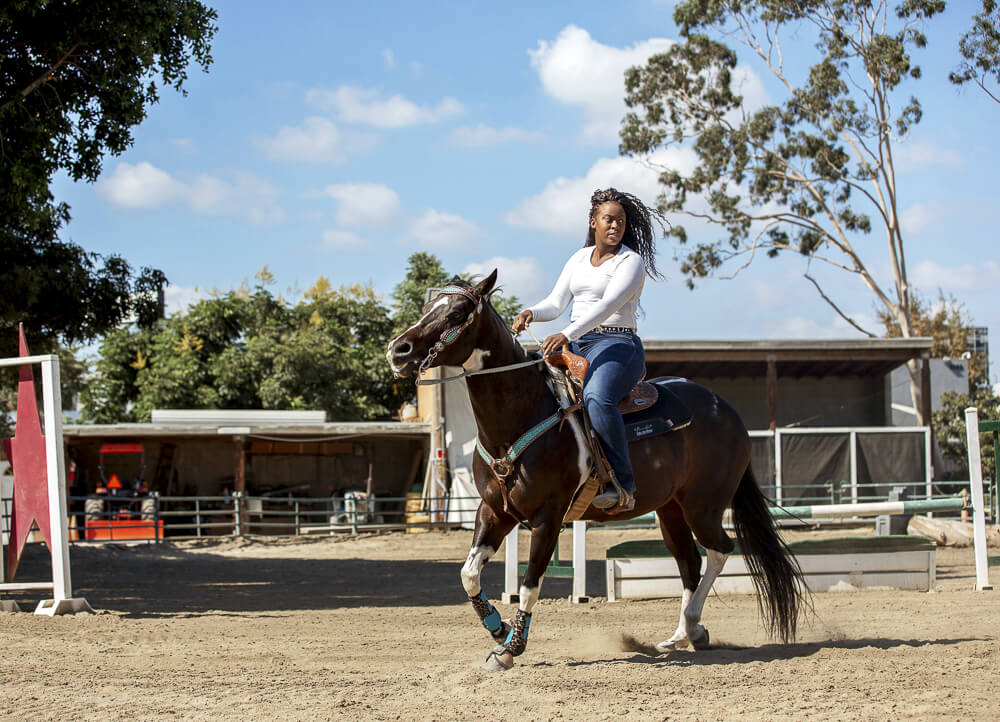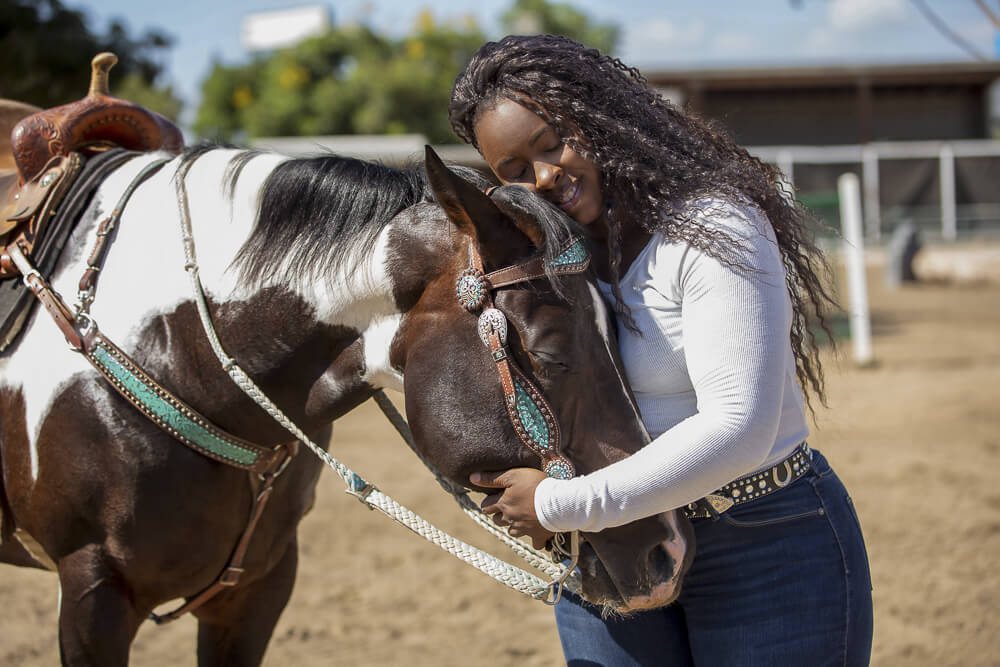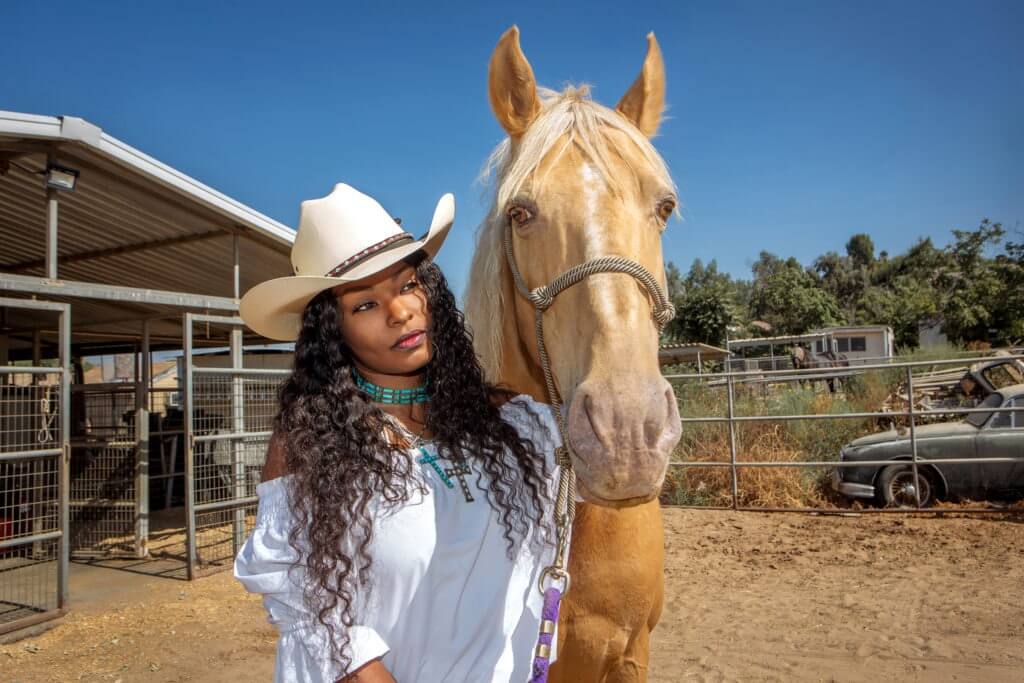Three local women bucking cowboy stereotypes are part of a lesser-known legacy of African-American horseriders in the West.
For Black History Month, Chanel Rhodes decided to give her horse — a brown-and-white spotted Tobiano named Lady — an experimental makeover. Dressed in jeans and a black shirt, Rhodes expertly crocheted tracks of brown and blonde extensions into Lady’s mane to create an “Afrocentric pony” look.
“I see all these people doing artsy things with horses,” Rhodes says. “I thought, what if I put a weave in my horse’s hair? What kind of reaction would I get?”
Rhodes posted a video of her project to Instagram. It was quickly shared through the equestrian community and landed her a guest spot on the “Young Black Equestrians” podcast, a program dedicated to equine culture with “an extra dose of melanin.” She soon began getting requests from other riders to create wig caps for their horses and her business venture, Mane Tresses, was born.
For Rhodes, horseback riding has been a life-long passion. “I never grew out of my pony phase,” she says on a sunny Saturday morning at the Rancho del Rio stables in Anaheim. “I was always obsessed with horses for as long as I can remember.”
Though Rhodes knew being a cowgirl was her destiny, the path forward was not always clear for the first-generation rider. Access to training was limited in Rhodes’ early years. Her mother, a single working parent, commuted with her daughter from Orange County to an equestrian center in Palos Verdes (approximately 80 miles round-trip) and often had to stretch the family budget to pay for lessons.
She credits her mother, Val, for keeping her dreams of becoming an equestrian alive. When she finally bought her first horse at the age of 20, Rhodes fully dedicated herself to her training. During the week, she attended college classes and worked as a server at her local Olive Garden, and on weekends she went to Hemet for riding lessons and cleaned stables to help finance her instruction.
“I was driving 70 miles every Saturday to go see my horse,” Rhodes says. “I was trying my best to stay in the life.”
Rhodes soon entered her first competitions doing ranch sorting and barrel racing on her Arabian quarter horse named Cha Cha. Getting to finally display her hard work before a crowd was a thrill, but Rhodes does recall an early sense of loneliness when she first entered the arena.
“Watching TV and looking at these girls — none of these girls looked like me,” she says in the “Young Black Equestrians” interview. “When I go out to my competitions, a lot of the time I am the only African American there … you do have that slight feeling of being alone.”
The feeling of standing out because of her skin color has only fueled Rhodes’ desire to become a better rider. After a hot and grueling three-hour-long training session, Rhodes sits at a wooden picnic bench in the shade with perfect posture, her long braids cascading over her toned shoulders, while she scrolls through her phone analyzing video of her riding form in recent competitions. She exudes a quiet strength as she talks about managing her perfectionist tendencies — typical of dedicated athletes — and explains the importance of having a network of black cowgirls to provide emotional and mental support.
Chanel Rhodes and her brown-and-white spotted Tobiano, Lady. Photo by Amanda Lopez.
“We keep each other encouraged,” Rhodes says. “We message each other. We call each other. We just keep those connections because, at the end of the day, those are the ones who really understand what it’s like to be in this sport and wear this skin.”
Rhodes now calls the Mountain View Farms stables at the Anaheim Equestrian Center her home and is currently expanding her skillset with English riding hunter/jumper lessons under the direction of trainer Jasmine Wheatley. Over the years she’s amassed an impressive collection of rodeo rosette ribbons which decorate an entire wall panel above her kitchen where she has neatly organized them for display.
“I will never stop doing this,” Rhodes says. “I’ve done charro. I’ve ridden Tennessee Walkers. I was learning how to drive a buggy. I just love this sport all around.”
Life on the Saddle
Sharon Braxton still remembers the butterflies she felt before her first competition. “I was concentrating on not letting my hat blow off,” she says with a laugh. “The horse was running all over the place. So it was not a good day. I started taking lessons after that.”
What blossomed in the decades that followed her inauspicious start was an illustrious career that extended across multiple sectors of the equine industry. Braxton was one of the first female African American barrel racers in the Women’s Professional Rodeo Association. She’s also a decorated trick rider, horse breeder, rodeo announcer and riding exhibition organizer.
A native of West Virginia, Braxton moved to Southern California in the late 1960s and spent her first paycheck to buy a stallion named Socks. As a child, she was always bringing stray animals home — much to her parents’ chagrin — and had always dreamed of one day owning a horse.
“I can look into a horse’s eye and it’s almost like looking into their soul,” Braxton says. “There’s just something about the beauty of the animal.”
When Braxton first started riding, she didn’t have the money for lessons, so she taught herself by attending exhibitions and observing the industry’s premier horsemen compete. “I would go to horse shows and never saw anybody of color there,” Braxton says. “But my take on it was that horse doesn’t see what color I am. It’s all up to me how far he and I can go together.”
The Black West
Though historians estimate that one in four cowboys was African American, their presence has been ignored in history books and popular culture. The image of the lone cowboy — commonly depicted as a white man on horseback — remains a popular and potent symbol in American culture. But the contributions of the black cowboy were instrumental in shaping the American frontier. Former slaves skilled in roping and rounding up longhorns were the lifeblood of the burgeoning cattle industry in the post-Civil War era. In Southern California, black horsemen traversed rugged cattle trails and worked as cowhands on Spanish ranchos as far back as Christopher Columbus’ arrival in America.
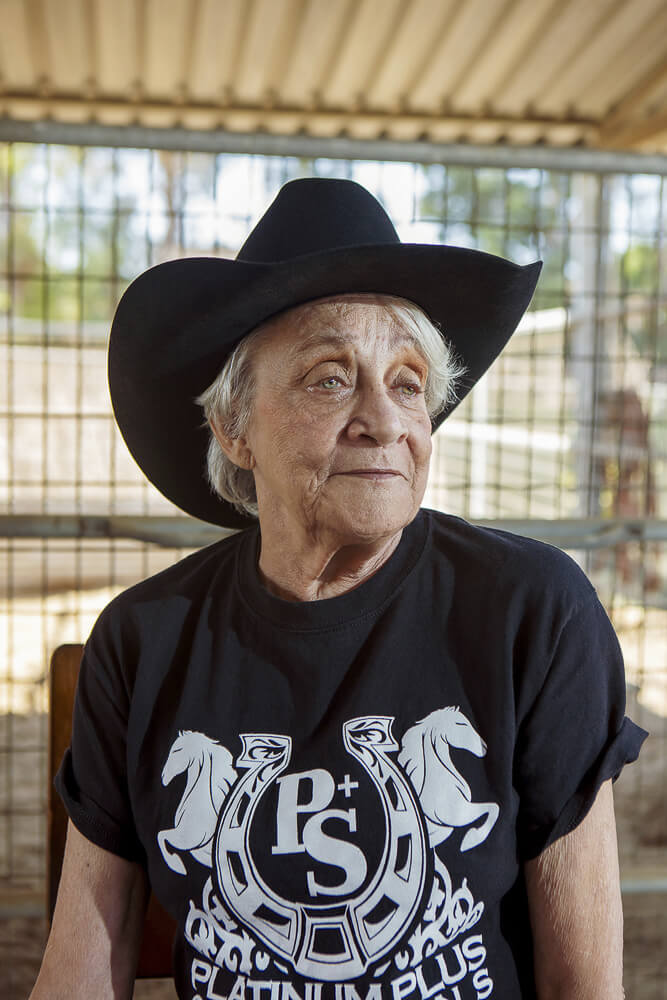
Women were also in on the action. Cowgirls like Stagecoach Mary — the first female African American postal carrier in the United States — had a reputation for being a gruff, pistol-packing rider who skillfully navigated dangerous terrain and brutal weather to deliver the nation’s mail. Black women also fulfilled another important role in the Old West. They were the keepers of history and cataloged the stories of their communities.
“The frontier came to symbolize all that was American — individualism, courage, excitement,” says Willian Loren Katz, author of “The Black West,” which details the contributions of black cowboys, soon to be released in an updated edition. “These ran counter to the stereotypes of black people so they got dropped in favor of the John Wayne cowboy type.”
Though it was rare to see people of color on horseback — Braxton says her coworkers looked at her like she “had two heads” when they learned of her cowgirl identity — she says people in the tight-knit horse community recognized her desire to excel and offered her the help she needed to succeed.
Braxton has made it a point to return the favor many times in her career by assisting and mentoring others. For example, she helped a young music promoter named Lu Vason bring his nascent all-black rodeo to Los Angeles.
The All-Black Rodeo
Vason had attended a rodeo in Wyoming in 1977 and noticed there were no cowboys of color competing in the arena. He envisioned organizing an event that would recognize the contributions of cowboys of color. That’s how the Bill Pickett Invitational Rodeo came to be.
The competition was named after the legendary William “Bill” Pickett, an African American cowboy who invented bulldogging — a stunt where riders leap from a galloping horse to wrestle a steer to the ground — and who taught celebrity cowboys like Tom Mix and Will Rogers the tricks of the trade. In 1989, almost 60 years after his death, Pickett became the first African American inducted into the ProRodeo Hall of Fame.
Vason had successfully launched his all-black rodeo in Denver and wanted to bring the event to cities across the country. He met Braxton through Charles Samson, a world-champion bull rider from Compton, and she agreed to connect him with the manager of the Los Angeles Equestrian Center where she had just produced her own riding exhibition — she even hired a limo to take him to his meetings.
“The frontier came to symbolize all that was American — individualism, courage, excitement. These ran counter to the stereotypes of black people so they got dropped in favor of the John Wayne cowboy type.”
Willian Loren Katz, author of “The Black West”
In 1986, the Bill Pickett Rodeo rode into Griffith Park and featured 150 riders from 20 states, including Samson who was himself inducted into the ProRodeo Hall of Fame in 1996. “That rodeo was the biggest one he had,” Braxton says. “One of the things that I think that’s been instrumental in promoting horses to people of color is the Bill Pickett Rodeo.”
In July, Braxton was presented the first annual Trail Blazer lifetime achievement award at the G Look Cowboy Ball for her contributions to the equine industry. Rhodes, who considers Braxton “her favorite cowgirl” and mentor, was on hand to film her acceptance speech at the event. At 72, Braxton has fully retired from riding but stays active by volunteering her time teaching the next generation of cowgirls and cowboys at various riding clinics across the Southland.
“I just love the opportunity to share with adults and kids that want to learn,” Braxton says. “When you learn how to ride properly it opens up a brand new world for you.”
A New Generation of Cowboys and Cowgirls
For Shantae Jackson, the excitement of riding a horse is like waking up early on Christmas morning. “There’s nothing like the enjoyment of being on a horse,” Jackson says from the backyard of her home in Acton, California. “Nothing can compare to that.”
Up until a few years ago, Jackson had never been on a horse. That all changed when she saw how much fun her 7-year-old daughter, Taemani, was having on horseback. “My daughter is into horses, so let me learn how to ride horses,” Jackson says. “I want to be part of this.”
Jackson says being a member of the horse community has been life-changing. “I used to get my hair done and my nails did, but this is a way of living,” she says, smiling as she points to her stylish denim jeans and black leather cowboy boots. “Could I see me without these horses? I don’t think so.”
Jackson, along with her husband Montrel Montgomery, operates Platinum Plus Stallions, a L.A. County nonprofit dedicated to empowering children on and off the saddle. What started over a year ago as an informal social gathering of neighborhood kids for a day of “family fun time” grew into a full-fledged operation. This summer, they hosted over 60 kids at the stables, including a group from a local foster care organization that participated in equine therapy and riding lessons.
“We want to teach all the inner-city kids that can’t afford it and give them an opportunity,” Jackson says of the Platinum Plus Stallions program, which offers lessons well below market rate so children of all backgrounds and financial means can learn to ride. “We want to get them off the streets and let them know there’s something better than that. Though they’re just horses, there are people from all different types of lives and backgrounds that can show something to these kids.”
Jackson sits in a canvas folding chair as she watches a group of Platinum Plus Stallion regulars receive instruction from Braxton, who they lovingly call “Auntie Sharon.” She’s here today to teach a riding clinic at Jackson’s Antelope Valley home.
One by one the kids mount Pretty Girl, a champagne-colored filly, and navigate her through an obstacle course of buckets and railway ties to practice basic groundwork. Taemani is the last to saddle up, and the young rider — who when not wearing her riding helmet sports a large hot-pink ribbon in her hair — expertly rides through the course with poise beyond her years.
Shantae Jackson with the stallion Goldie. Photo by Amanda Lopez.
“You’ve got yourself a real cowgirl there,” Braxton tells Jackson who proudly looks on.
“These horses give adults, as well as kids, the most confidence ever,” Jackson says. “When you can deal with something this big being so little the world is at your fingertips.”
For Montgomery, running Platinum Plus Stallions not only gives him a chance to support his daughter — who inherited his love of horses — it’s also a way for him to give back to the community. Montgomery originally hails from South Los Angeles and is the nephew of the infamous drug trafficker “Freeway” Rick Ross. In the early 2000s, he got caught up in the family business and ended up serving 11 years in federal prison on drug trafficking charges. When Montgomery was released, he vowed to remake his life and returned to his background in horse training and riding. Now he reinvests his own money into growing the Platinum Plus Stallions program so he can share his knowledge and experience with inner-city kids, hoping to give them a pathway to success.
“We want to teach kids that there’s a whole community behind them,” Montgomery says. “Anyone is invited — from any race, creed, gender or background — to come out here and ride. It’s all about the youth for me.”
Now that summer is coming to an end, Montgomery and Jackson hope to expand the Platinum Plus offerings to include an after-school program — complete with transportation and a computer lab so kids can have a structured place to focus on homework and their equestrian training. “Community support is the biggest thing,” Jackson says of the curriculum. “We’re just trying to open up doors that people haven’t knocked down or haven’t tried to enter through. We want this to be one happy community.”
Reimagining the Cowboy
Down in the practice arena of the Industry Hills Expo Center, Rhodes begins her preparations for the women’s barrel racing competition at the 35th annual Bill Pickett Invitational Rodeo. It’s been a busy summer for Rhodes. She recently got engaged to her boyfriend, Andy, and finished the prototype for her mane extensions, which she plans to put into full production later this year. Her immediate goal is to secure sponsorships so she can enter more competitions and focus on riding full-time.
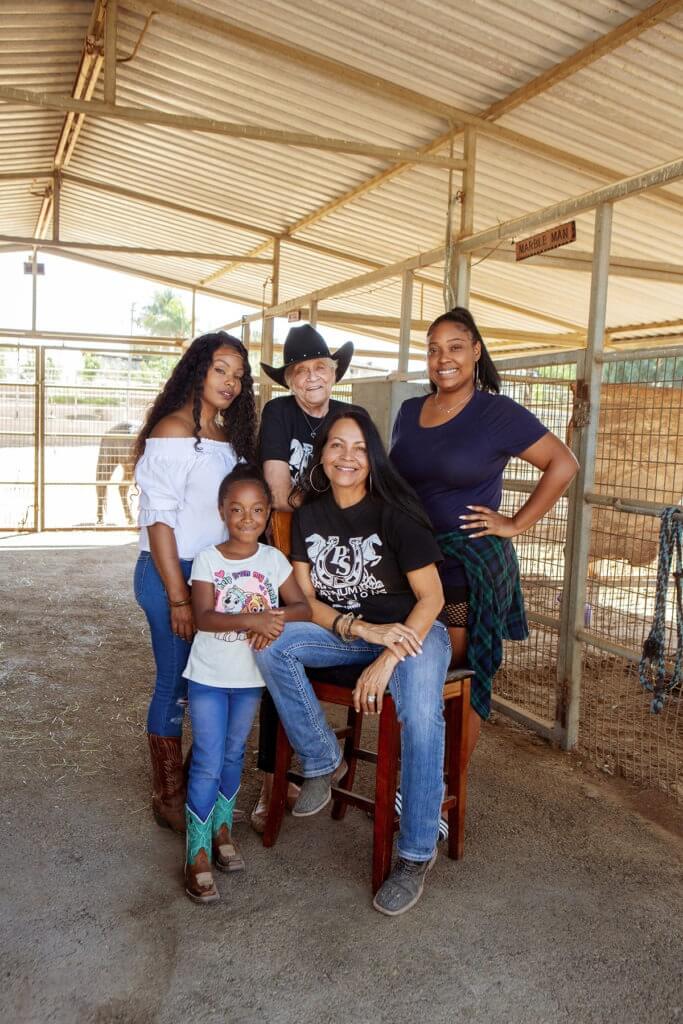
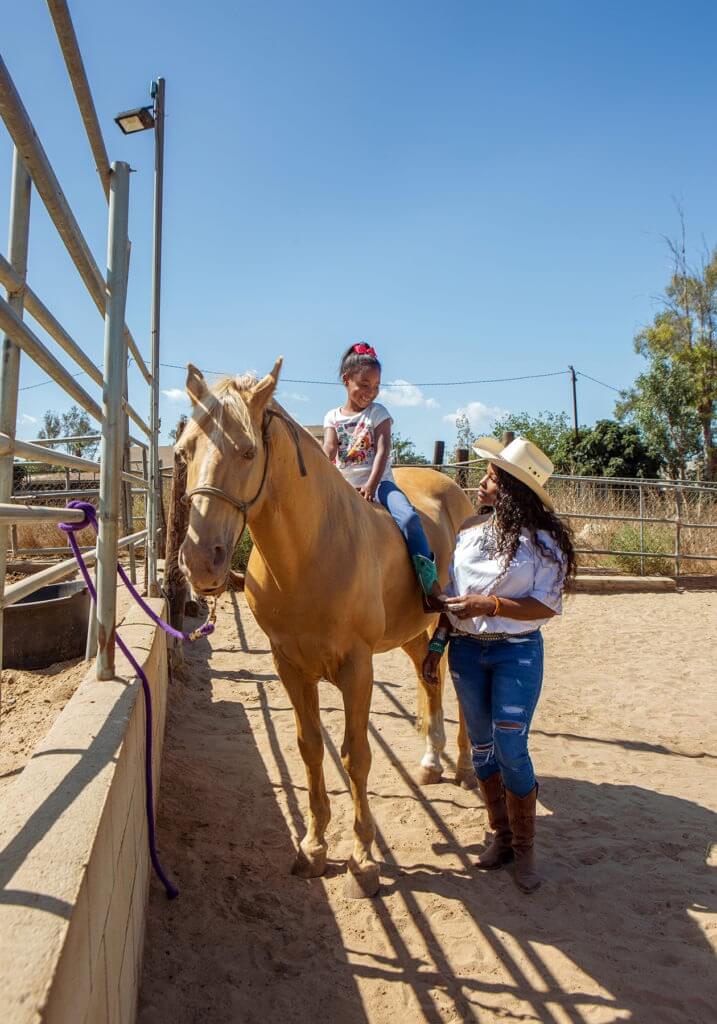
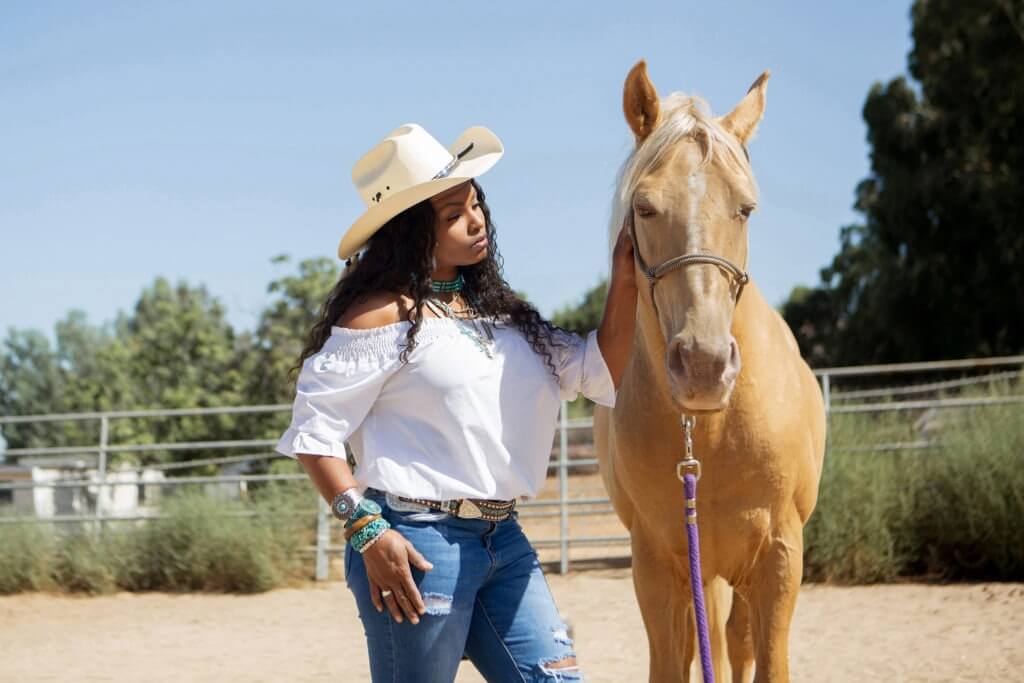
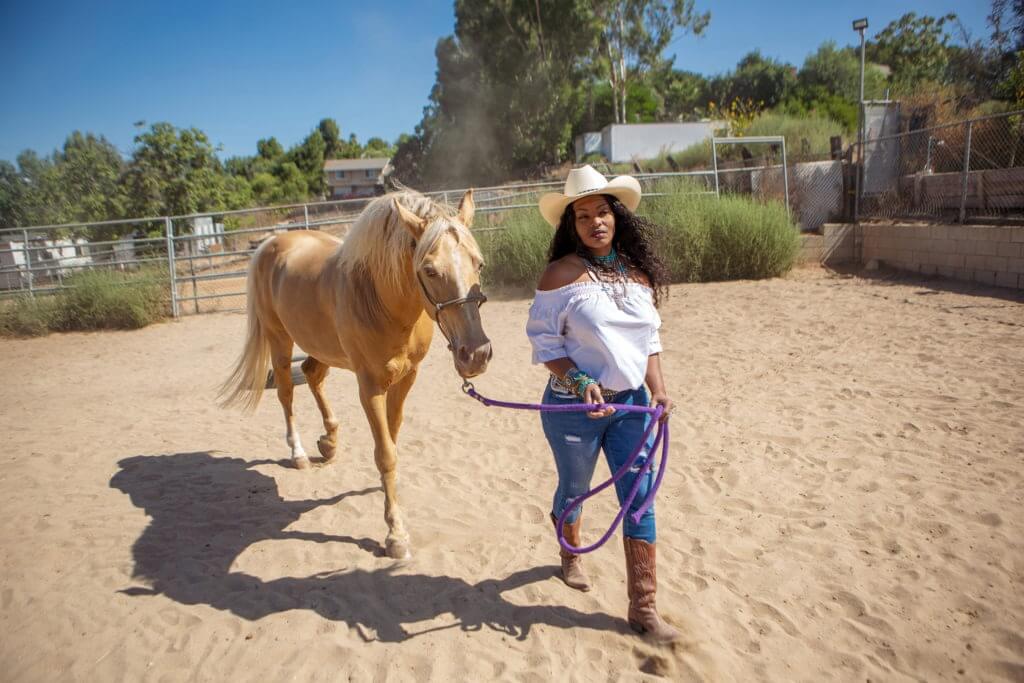
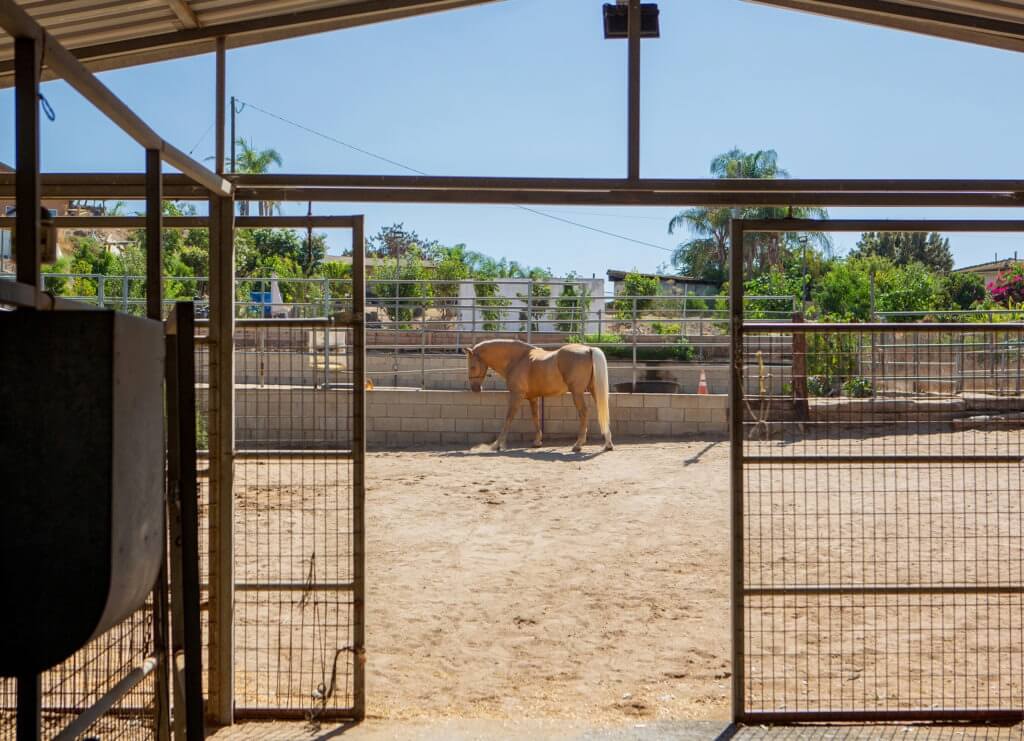
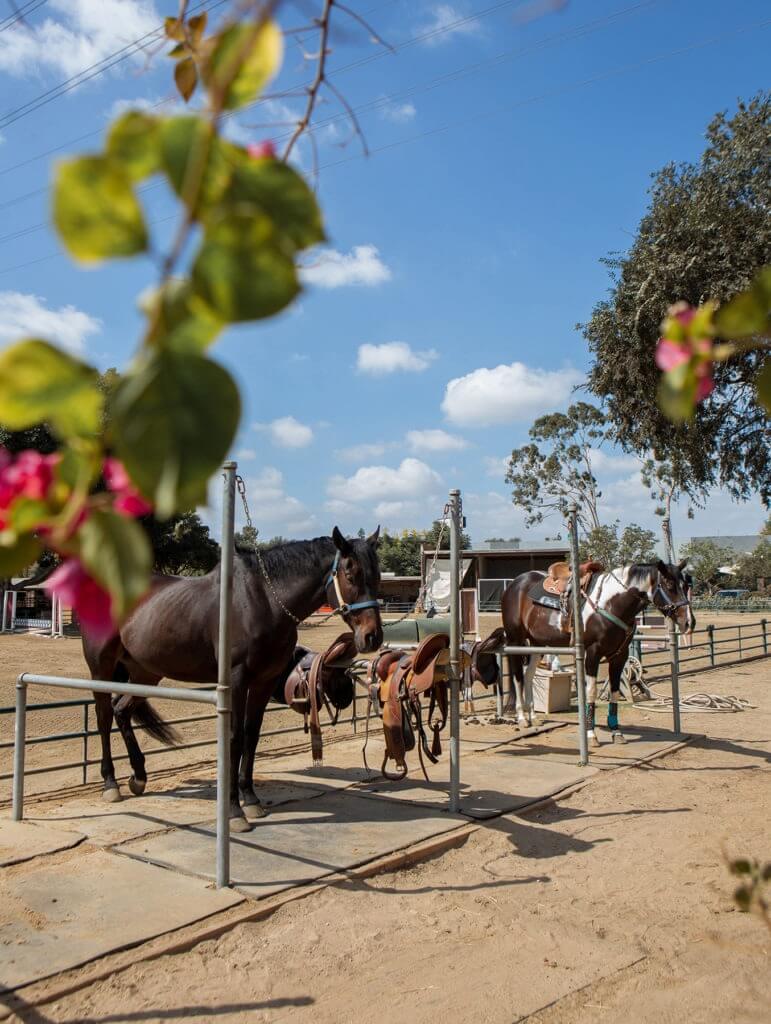
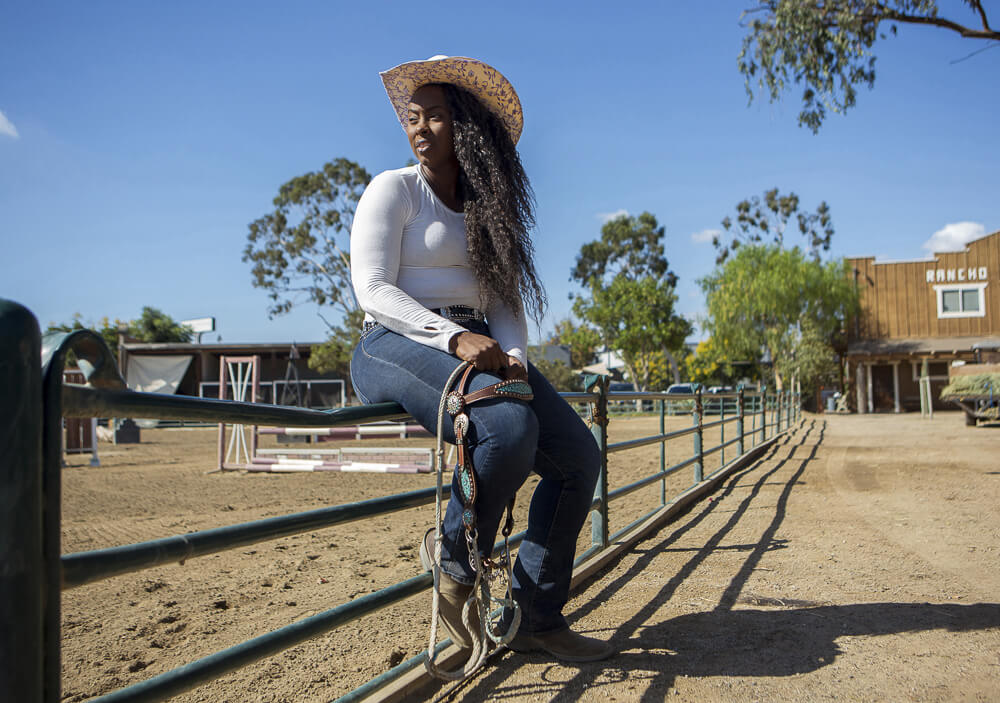
Braxton is there in the sold-out crowd, proudly watching the festivities she helped develop some three decades earlier. “The image of the cowboy has always been one of a stellar figure,” she says. “It’s just standard for what’s right. That image is alive and will never die.”
The event feels less like a rodeo and more like a jubilant family reunion. Lil Nas X’s record-breaking single “Old Town Road” blares over the loudspeaker, prompting attendees to stand up from the bleachers and start dancing. Cheers erupt when Oscar-winner Jamie Foxx rides into the arena as the honorary grand marshal to kick off the opening ceremonies. Reporters from the New York Times and USA Today mill around the venue, along with a professional film crew that is shooting a Compton Cowboys promotional video for Ariat, a major producer of equestrian performance gear.
“It’s honestly really encouraging to me. I’ve always wanted to share this,” Rhodes says of the growing recognition of black equestrians. “I cry sometimes because it is our time. People are looking at us now. People are finally starting to realize us.”

